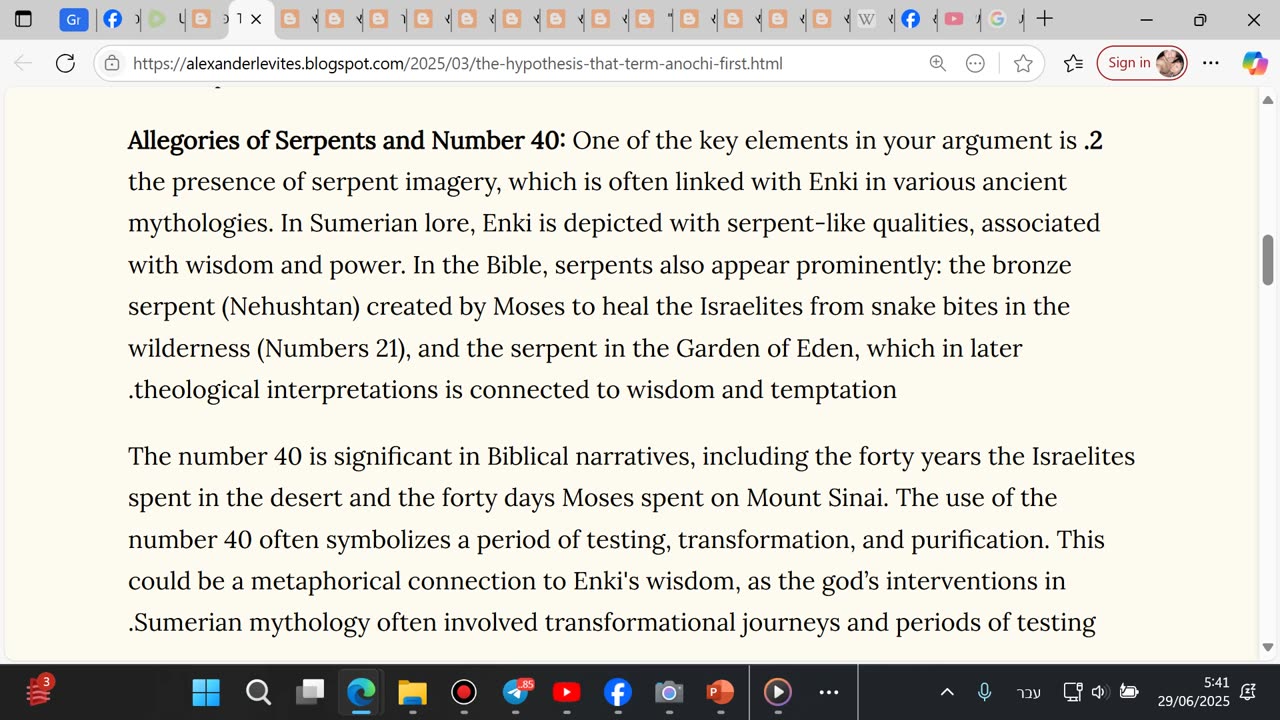Premium Only Content

Anochi" (אֲנֹכִי), the first word of the Ten Commandments in Exodus, linked to Enki
https://alexanderlevites.blogspot.com/2025/03/the-hypothesis-that-term-anochi-first.html
The hypothesis that the term "Anochi" (אֲנֹכִי), the first word of the Ten Commandments, in Exodus, may be linked to Enki, the Sumerian god of wisdom, creation, and water, is an intriguing one. The word "Anochi" translates to "I am" or "I, even I" in Hebrew and appears at the beginning of God’s self-identification in Exodus 20:2, where Yahweh declares, "I am the Lord your God, who brought you out of the land of Egypt, out of the house of bondage."
1. Enki's Symbolism and "Anochi": Enki is a central deity in Sumerian mythology, often depicted as a wise god of creation, water, and life. His connection to water, knowledge, and creation has symbolic resonance with the Hebrew God, especially considering that Yahweh is often associated with creation, wisdom, and the life-giving aspects of water (e.g., the flood narrative, the parting of the Red Sea). Enki’s role as a creator god parallels the Biblical notion of God’s active role in the formation of the world and humanity. The term "Anochi" could therefore be interpreted as encoding not only divine authority but also an ancient connection to the concepts of wisdom, creation, and transformation that Enki represents.
2. Allegories of Serpents and Number 40: One of the key elements in your argument is the presence of serpent imagery, which is often linked with Enki in various ancient mythologies. In Sumerian lore, Enki is depicted with serpent-like qualities, associated with wisdom and power. In the Bible, serpents also appear prominently: the bronze serpent (Nehushtan) created by Moses to heal the Israelites from snake bites in the wilderness (Numbers 21), and the serpent in the Garden of Eden, which in later theological interpretations is connected to wisdom and temptation.
The number 40 is significant in Biblical narratives, including the forty years the Israelites spent in the desert and the forty days Moses spent on Mount Sinai. The use of the number 40 often symbolizes a period of testing, transformation, and purification. This could be a metaphorical connection to Enki's wisdom, as the god’s interventions in Sumerian mythology often involved transformational journeys and periods of testing.
3. Michael the Archangel vs. Enki in Biblical Contexts: While your hypothesis associates Enki with the early stages of Hebrew religious identity through the use of "Anochi," it is important to note that Enki does not seem to align with later Biblical developments, particularly when it comes to figures such as Michael the Archangel. In the fall of Jericho (Joshua 6), it is Michael, rather than Enki, who is understood to be the protector of Israel, and his presence symbolizes divine judgment rather than the gentler, life-giving aspects associated with Enki.
Michael, in Christian and Jewish traditions, is portrayed as a warrior angel who leads the heavenly army against the forces of evil. This shift from a life-giving, wisdom-bringer figure (Enki) to a military, judgment-focused figure (Michael) reflects a broader transition in Israelite theology from the incorporation of foreign deities to the establishment of a more distinct and exclusive monotheism centered around Yahweh.
4. Number 40 and Serpent Allegories in Exodus and the Hebrews: The number 40 is closely linked to periods of trial, purification, and revelation in the Hebrew Bible. This can be seen not only in the wanderings of the Israelites but also in the story of Moses’ time on Mount Sinai. The serpent, too, has a multifaceted role in these narratives. It could symbolize both danger and salvation, as seen in the story of the bronze serpent (Nehushtan), which was used to heal the Israelites but later became an object of idolatry. This dual role of the serpent aligns with Enki’s ambiguous role as both a god of wisdom and sometimes of chaos.
Conclusion: The connection between "Anochi" and Enki is a fascinating one, and while the evidence can be compelling, it remains speculative. The serpent allegories, number 40, and parallels in the development of Israelite religion point to potential influences from older Near Eastern myths, particularly those involving Enki. However, as Israelite religious identity became more defined, particularly during the time of the monarchy and later with the influence of figures like Michael the Archangel, a clear distinction was made between the god of Israel and earlier, more polytheistic beliefs. This transformation marks the shift from the wisdom and life-giving associations of Enki to the judgment and power of Yahweh and his heavenly hosts.
By focusing on these metaphors, symbols, and numbers, we can see how ancient traditions and foreign influences may have shaped the early Jewish understanding of God. However, it’s essential to acknowledge that as Israelite theology evolved, these influences were absorbed, adapted, and eventually rejected as the monotheistic worship of Yahweh became more firmly established.
-
 UPCOMING
UPCOMING
The Amber May Show
4 hours agoShutdowns, Shakeups, and 50-Year Mortgages | Sam Anthony
581 -
 LIVE
LIVE
StoneMountain64
4 hours agoBattlefield REDSEC $100k tourney tomorrow
138 watching -
 LIVE
LIVE
GritsGG
2 hours ago#1 Most Warzone Wins 3957+!
69 watching -
 2:00:02
2:00:02
The Quartering
4 hours agoDemocrat Civil War After Collapse, Viral Wedding Ring Insanity, New Trump Pardons & Huge Trans Ban
155K57 -
 LIVE
LIVE
ZWOGs
3 hours ago🔴LIVE IN 1440p! - ARC RAIDERS! Grinding XP and Upgrades! - Come Hang Out!
72 watching -
 LIVE
LIVE
Meisters of Madness
55 minutes agoNinja Gaiden 4 - Quest for The Master Difficulty
33 watching -
 25:52
25:52
Stephen Gardner
2 hours ago🔥Adam Schiff OBLITERATED by Trump's NEW EVIDENCE!
28K28 -
 LIVE
LIVE
Dad Saves America
5 hours agoMamdani and Fuentes Have Captured Our Kids. Can We Get Them Back?
62 watching -
 LIVE
LIVE
LFA TV
20 hours agoLIVE & BREAKING NEWS! | MONDAY 11/10/25
1,075 watching -
 2:27
2:27
GreenMan Studio
2 hours agoAUSTRALIA A PSYOP?! W/Greenman Reports
4.07K